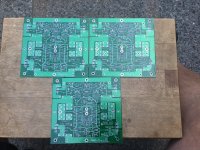Hi Eric
Thanks for your response. Greatly appreciated.
I reckon its safer to run the amps with the prescribed 22V rails. On reflection, my speakers are a nominal 4 ohms, so definitely better to go for higher current.
PS: do you see any issue with using the IRF 140 Fets, instead of the 240 as is commonly used?
Kind Regards
George.
Thanks for your response. Greatly appreciated.
I reckon its safer to run the amps with the prescribed 22V rails. On reflection, my speakers are a nominal 4 ohms, so definitely better to go for higher current.
PS: do you see any issue with using the IRF 140 Fets, instead of the 240 as is commonly used?
Kind Regards
George.
Pass DIY Addict
Joined 2000
Paid Member
I don't have any personal experience with the IRF140 devices. I know others have used 044, 240, and 244 with good results...
..
PS: do you see any issue with using the IRF 140 Fets, instead of the 240 as is commonly used?
Kind Regards
George.
I've used IRF140 in every aleph I've done. Just keep in mind it's a 100V device.
Bonus: you need less of them.
I’d be interested in buying please PM me if still available!I have 6 unused original v1.0 boards now going spare if anyone is still looking.
Hello. I collected my Aleph X own and ran into a problem. Periodically, I have a slight crackling and rustling in the speakers. And it can appear at any time and just disappear. Or in the left channel, or in the right channel. Sometimes not strong, sometimes stronger. It does not depend on the temperature regime. May be immediately after switching on and can be after warm-up. And this sound is not like a rumble from an earth loop or overexcitation. More like a bad contact somewhere. I disassembled the amplifier, did not detect anything visually, the suspicious places on the boards were lost again, but the problem did not dare. What could it be? Thank you in advance for your help!
usual things - check all mosfets for resistance between mid pin (drain) and heatsink ,check torque of screws, reflow any suspicious solder joints
often you can't see bad solder joint , but reflow helps
often you can't see bad solder joint , but reflow helps
I’m looking for the BOM for the original pcb, can’t seem to find any info in the wiki or am i just looking in the wrong corner?
Thanks in advance!
Thanks in advance!
Thank you very much!
I see the supply being marked +15V and -15V, now i am planning to use toroidy’s with 22v secundairy’s, that changes quite a few things i have read, i will be diving into this more before i ask for more info that can be found easily.
I see the supply being marked +15V and -15V, now i am planning to use toroidy’s with 22v secundairy’s, that changes quite a few things i have read, i will be diving into this more before i ask for more info that can be found easily.
that's big jump from 15Vdc to 27V5dc
making amp , or welder ?
be sure that you are able to do all needed for that sort of transition ,same as that you know proper reasons for that massive change , before ordering xformers
making amp , or welder ?
be sure that you are able to do all needed for that sort of transition ,same as that you know proper reasons for that massive change , before ordering xformers
Have not ordered them but i realize i have to get all my info before i start ordering parts 😛
open your own thread , take care to shoot questions in order by importance
what power you need .... what's primary - 4R or 8R load , how big you intend to go with heatsinks etc.
for few important details , look here : Babelfish XJ , or JX …….. or whatever | Zen Mod Blog
you'll see how planning is important , and hopefully realize how erring on big side can be costly ...... or too costly
what power you need .... what's primary - 4R or 8R load , how big you intend to go with heatsinks etc.
for few important details , look here : Babelfish XJ , or JX …….. or whatever | Zen Mod Blog
you'll see how planning is important , and hopefully realize how erring on big side can be costly ...... or too costly
for few important details , look here : Babelfish XJ , or JX …….. or whatever | Zen Mod Blog
OMG! 40 fets per channel instead of 4? I will stick to the original design and lay it out for 4 Ohm speakers. Start small was your advice 😛
4 is for sissies 
either make it good , or do not make it at all
no less than 2 mosfets per quadrant , so 8 per channel
only in case that you use IRFP150 , practically 2pcs of IRFP240 in one case , you can go with 1 per quadrant
for 4R speakers , choose rails up to 18Vdc , no higher
lower than that , problems with varying mosfet's capacitances

either make it good , or do not make it at all
no less than 2 mosfets per quadrant , so 8 per channel
only in case that you use IRFP150 , practically 2pcs of IRFP240 in one case , you can go with 1 per quadrant
for 4R speakers , choose rails up to 18Vdc , no higher
lower than that , problems with varying mosfet's capacitances
Is there harm in using the IRFP244 as the original design then? i hear numbers flying over the place, 044, 240, 244, 150? all being easily available for me in unmatched bulk so i have to match them by myself.
- Home
- Amplifiers
- Pass Labs
- Aleph-X builder's thread

